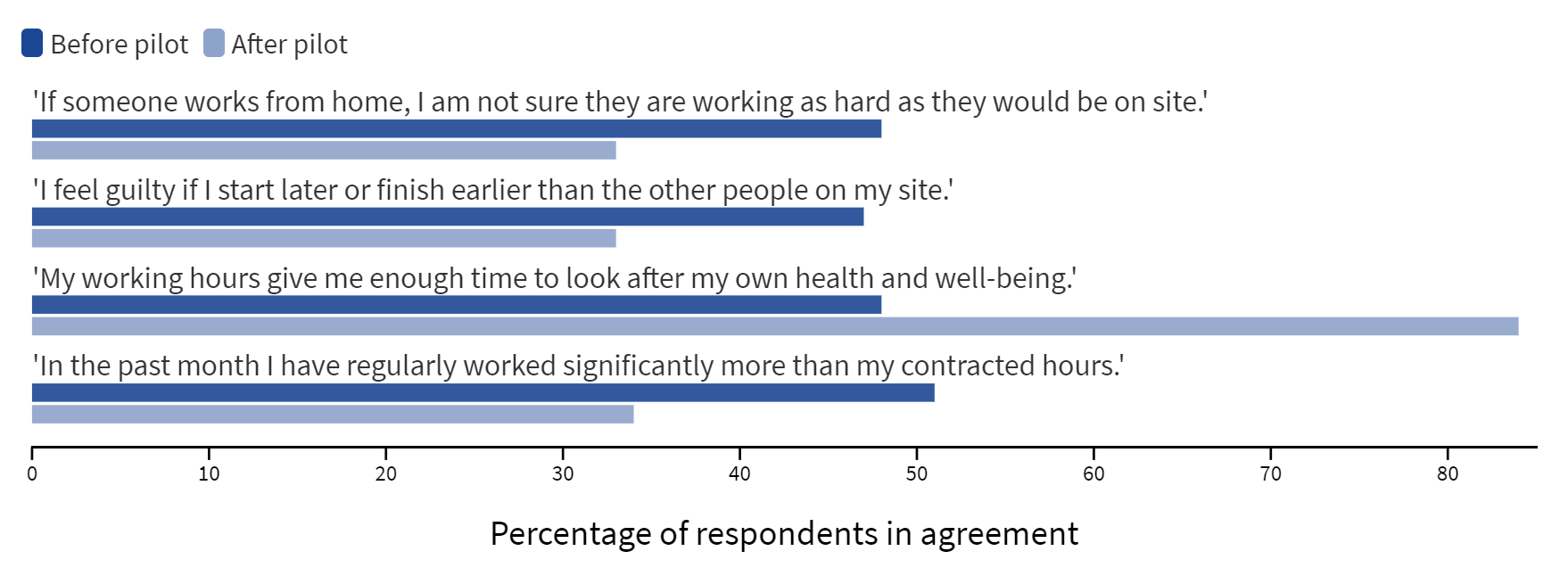
The challenges of attracting and retaining talent in UK construction are well known. The culture of long hours and a lack of arrangements for flexible working are one key barrier for many – particularly women, who leave the industry at a faster rate than men.
In recent years, construction has invested in measures to make the profession more attractive, looking at ways to improve well-being and work–life balance. In many other industries, flexible working is seen as essential to meeting these challenges, yet construction has to date not found a way to integrate it.
In 2020, Timewise found that only 10% of job vacancies in construction – and just 2% of frontline roles – offered flexible working.
Part of the issue is that employers do not know how to offer flexibility in a way that works effectively for both the business and its employees. While a few large firms have trialled informal flexible working for on-site jobs, there has been little systemic, industry-wide action.
Two years after research began and a global pandemic later, the Timewise study Making construction a great place to work: can flexible working help? has demonstrated that not only is flexible working possible for frontline operational roles in construction, but that it is beneficial from the perspectives of the individual worker and the overall business.
Four pilots
The pioneering study, co-designed by Timewise and industry organisation Build UK with support from Barclays LifeSkills programme and CITB, comprised pilots with four construction firms, BAM Construct, BAM Nuttall, Skanska UK and Willmott Dixon. The pilots lasted between six weeks and three months.
- changing attitudes and behaviours
- improving workers' input into their working patterns
- improving managers' capability to implement flexible working
- increasing home working for site workers whose roles were not fully manual.
- a team-based approach to flexible working, setting shifts by taking workers' personal preferences into account as well as the need to achieve business outputs
- an output-based approach designed to allow workers to start earlier and leave when the day's work was complete
- staggered start and finish times, alternating between teams, so that all workers got the pattern they wanted every other week
- a flexi-day approach, in which workers could work additional hours in exchange for one day off each month
- home working for desk-based roles.
Feedback from the pioneers
The success of the pilots was measured in surveys carried out beforehand and afterwards, which gauged shifts across four key indicator statements, as show in Figure 1.

More qualitative insights were obtained through focus groups with some of the participating workers, and interviews with a selection of managers and senior stakeholders.
- 'I now get to see more of my son, and this is very important to me personally. Knowing I can do this motivates me to get my work done quicker,' said a supervisor.
- 'I am cooking more at home now, eating much healthier and making extra to take in for my lunch. Previously I was eating out of a tin because it was late and that was a quick way. But I’m enjoying cooking, feel healthy and more energetic already. This extra time is making a really big difference to my health,' a frontline worker said.
- 'I would now definitely choose a job like this with flexibility, over the bit extra in money' said another frontline worker.
- 'It is really interesting how we have been working fewer hours and still managed to catch up the programme,' a supervisor said.
- 'A colleague calculated that with savings in travel, hours and hotel costs, we have saved over £1m from working with more agility,' a manager reported.
- 'People are more energised and working faster. If you are being paid for a ten-hour shift you will make it last ten hours; but if there is an incentive to still get paid a full shift but finish quicker you are focused to get the work done,' said a supervisor.
Business owners, project leaders, managers and supervisors looking to implement flexible working should follow the Timewise ten-point action plan for improving flexible working in construction.
The ten-point action plan
1. Understand your baseline.
2. Articulate your vision and case for action.
3. Create an action plan for your pilot.
4. Train your managers.
5. Determine the appropriate flexible working patterns.
6. Communicate the plan to all workers at your pilot site.
7. Run the pilot.
8. Evaluate and codify learning.
9. Develop and communicate guidance and tools.
10. Roll out and review regularly.
